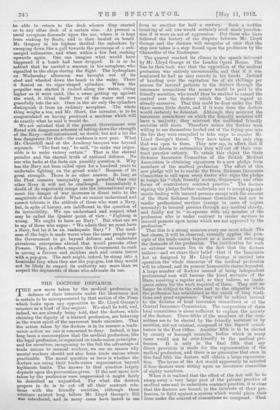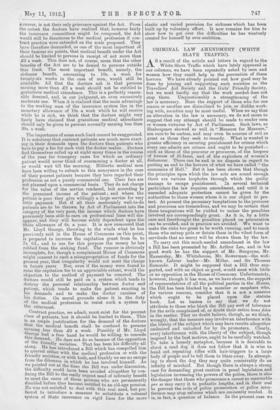THE DOCTORS' DEFIANCE.
THE new move taken by the medical profession in defence of their interests under the Insurance Act is certain to be misrepresented by that section of the Press which looks upon any opposition to Mr. Lloyd George's 'measure as a kind of lhe-majeste. We shall be told, and, indeed, we are already being told, that the doctors, while claiming the dignity of a learned profession, are behaving in the worst spirit of the narrowest trade unionism. That the action taken by the doctors is in its essence a, trade- union action no one is concerned to deny. Indeed, it has long been a commonplace that the medical profession, like the legal profession, is organized on trade-union principles ; and for ourselves, recognizing to the full the advantage of trade unions to manual workers, we see no reason why mental workers should not also form trade unions where practicable. The moral question at issue is whether the doctors are using their trade-union organization beyond legitimate limits. The answer to that question largely depends upon the provocation given. If the new Move now taken by the profession were unprovoked it might fairly be described as unjustified. For what the doctors propose to do is to cut off all their contract rela- tions with the friendly societies, although these relations existed long before Mr. Lloyd George's Bill was introduced, and in many cases have lasted in one form or another for half a century. Such a sudden breaking of old ties would certainly need much justifica- tion if it were an act of aggression. But those who have followed the history of the dispute between Mr. Lloyd George and the doctors will recognize at once that the step now taken is a step forced upon the profession by the Chancellor of the Exchequer.
The quarrel reached its climax in the speech delivered by Mr. Lloyd George at the London Opera House. The line he then took was that the opposition of the medical profession was entirely unreasonable, and that if it was continued he had an easy remedy in his hands. Instead of handing over the capitation fee of six shillings per annum for insured patients to the doctors through the insurance committees the money would be paid to the friendly societies, who would thus be enabled to extend the control over the doctors which the latter regard as already excessive. That this could be done under the Bill there seems little doubt, and if it were done the doctors would certainly be defeated. Although they mistrust the insurance committees on which the friendly societies will have a majority, they mistrust the undiluted friendly societies still more. Therefore unless the doctors were willing to sea themselves hurled out of the frying-pan into the fire they were compelled to take steps to counter Mr. Lloyd George's threat. They have taken the Only step that was open to them. They now say, in effect, that if they are driven to extremities they will cut off their con- tract practice entirely. To attain • this object the State Sickness Insurance Committee of the British Medical Association is obtaining signatures to a new pledge from members of the medical profession. The effect of this now pledge will be to enable the State Sickness Immune() Committee to call upon every doctor who signs the pledge to resign his " club, friendly society, dispensary, and other forms of contributory contract practice." The doctors signing the pledge further undertake not to accept appoint- ments dealing with insured persons except with the consent of the State Sickness Insurance Committee and not to render professional services (except in cases of urgent necessity) to insured persons through any medical charity, and finally not to " co-operate with any member of the profession who is under contract to render services to insured persons upon terms which are not approved by the profession." That this is a strong measure every one must. admit. The last clause, it will be observed, virtually applies the prin- ciple of the trade-union boycott as a, means of enforcing the demands of the profession. The justification for such an extreme measure lies in the fact that the doctors believe—and we share their belief—that if the Insurance Act as designed by Mr. Lloyd George is carried into operation the whole character of the medical profession will be altered, and its present honourable status degraded. A large number of doctors instead of being independent professional men will become the hired servants of the State, receiving a regular and, as they believe, an inade- quate salary for the work required of them. They will no longer be subject to the rules and to the etiquette which the profession has established as the result of long tradi- tions and great experience. They will be subject instead to the dictates of local insurance committees or of the Central Insurance Commission. The composition of these local committees is alone sufficient to explain the anxiety of the doctors. Three-fifths of the members of the com- mittees are to be elected by the friendly societies or by societies, not yet existent, composed of the deposit. contri- butors in the Post Office. Another fifth is to be elected by county or borough councils, bodies which in many cases would not be over-friendly to the medical pro- fession. It is only in the final fifth that any direct provision is made for the representation of the medical profession, and there is no' guarantee that even in. this final fifth the doctors will obtain a large representa- tion. The terms of the Act would apparently be satisfied if four doctors were sitting upon an insurance committee of eighty members. When it is realized that the effect of the Act will be to sweep away a very large part of the private practice of medical men and to substitute contract practice, it is clear that the doctors are bound, in the interests of their pro- fession, to fight against a system which would place their lives under the control of committees, so composed. That. however, is not their only grievance against the Act. From the outset the doctors have realized that, however fairly the insurance committees might be composed, the Act would still be disastrous to the medical profession if con- tract practice were extended on the scale proposed. They have therefore demanded, as one of the most important of their fambus six points, that medical benefit under the Act should be limited to persons in receipt of not more than £2 a week. This does not, of course, mean that the other benefits of the Act are to be denied to persons outside this limit. The most important benefit, namely, the sieknoss benefit, amounting to 10s. a week for twenty-six weeks in the case of men, would still be available. All that the doctors ask is that persons earning more than £2 a week should not be entitled to gratuitous medical attendance. This is a perfectly reason- able demand, and, in our judgment, an even excessively moderate one. When it is realized that the main advantage to the working man of the insurance system lies in the monetary allowance of 10s. a week which he will receive while he is sick, we think that the doctors might very fairly have claimed that gratuitous medical attendance should only be given to persons normally earning less than 30s. a week.
The importance of some such limit cannot be exaggerated. It is notorious that contract patients are much more exact- ing in their demands upon the doctors than patients who have to pay a fee for each visit the doctor makes. Doctors find themselves called up at night many times in the course of the year for trumpery cases for which an ordinary patient would never think of summoning a doctor at all, or would wait till the morning. Hitherto medical men have been willing to submit to this annoyance in the case of their poorest patients because they have regarded their profession as not a purely commercial one. Their fees are not planned upon a commercial basis. They do not charge for the value of the service rendered, but according to the presumed income of the patient ; and where the patient is poor they give willingly a large service for very Jittle payment. But if all their moderately well-to-do patients are to be thrown by Act of Parliament into the category of the very poor, the income which doctors have previously been able to earn on professional lines will dis- appear, and they will become solely dependent upon the State allowance of 6s. a year. It is now rumoured that Mr. Lloyd George, throwing to the winds what he has previously said in the House of Commons on this point, is prepared to increase the capitation grant from 68. to 78. 6d., and to use for this purpose the money he has robbed from the sinking fund. The rumour is obviously incomplete, for, though a complaisant House of Commons might consent to such a misappropriation of funds for the .present year, that irregularity would not meet the charge in future years Nor, even if the money were found to raise the capitation fee to an appreciable extent, would the objection to the method of payment be removed. The doctors would still be paid on a system which tends to destroy the personal relationship between doctor and patient, which tends to make the patient exacting in his demands and to make the doctor careless of his duties. On moral grounds alone it is the duty of the medical profession to resist such a system to the uttermost Contract practice, we admit, must exist for the poorest class of patients, but it should be limited to them. This is an ample justification for the demand of the doctors that the medical benefit shall be confined to persons earning less than £2 a week. • Possibly if Mr. Lloyd George had a free hand he would be willing to concede this demand. He dare not do so because of the opposition of the friendly societies. That has been his difficulty all along. He has introduced a Bill which has compelled him to quarrel either with the medical profession or with the friendly societies, or with both, and frankly we see no escape from the dilemma in which ho has involved himself. As we pointed out at the time tho Bill was under discussion, the difficulty could have been avoided altogether by con- • fining the Bill to the really urgent need of infirmity benefit to meet the cases of those persons who are permanently disabled before they become entitled to an old-age pension. ,Ho was not satisfied to deal with this real need, but pre- • ferred to introduce a measure to substitute a colossal .system of State insurance on rigid lines for the more elastic and varied provision for sickness which has been built up by voluntary effort. It now remains for him to show how to get over the difficulties be has wantonly created for himself by over-ambition.











































 Previous page
Previous page